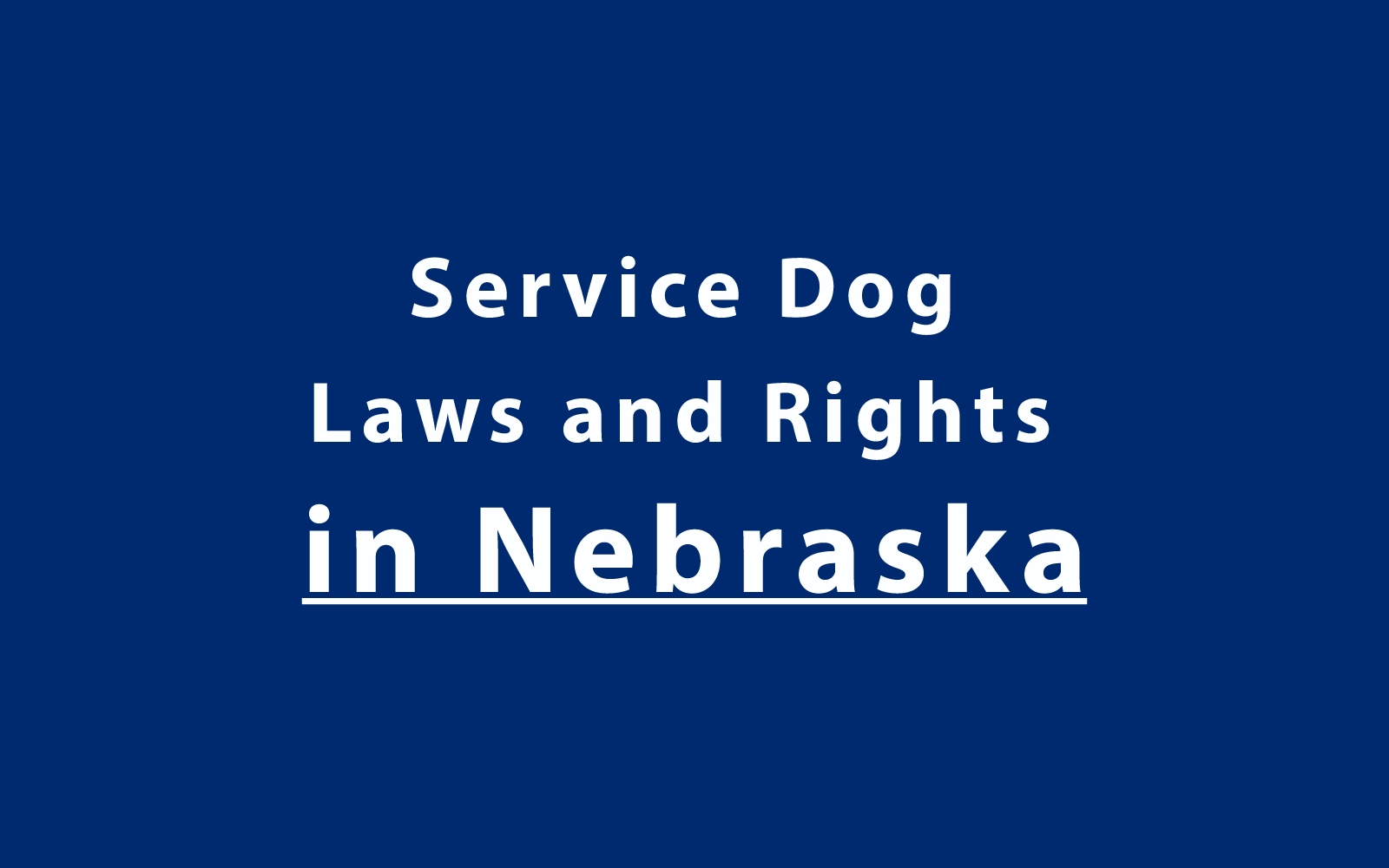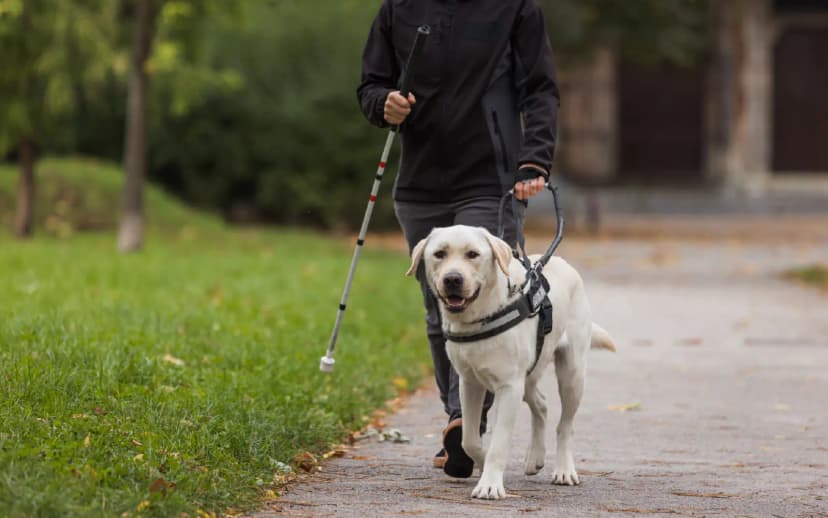Service Dog Laws and Rights in Nebraska

For individuals living with disabilities, service dogs offer not only companionship but also essential support in daily life. From guiding the visually impaired to calming individuals during psychiatric episodes, these animals play a pivotal role. If you live in Nebraska or plan to travel there, it’s vital to understand your rights and responsibilities as a service dog handler. This guide outlines both federal and Nebraska-specific laws to help you navigate life with a service dog more confidently.
1. Legal Definition of a Service Dog in Nebraska
In Nebraska, the legal definition of a service dog aligns with the federal standards established by the Americans with Disabilities Act (ADA). A service dog is defined as a dog that is individually trained to perform specific tasks or do work for a person with a disability. Disabilities can include physical, sensory, psychiatric, intellectual, or other mental disabilities.
Importantly, service dogs are not the same as emotional support animals (ESAs) or therapy dogs. While ESAs offer comfort and support simply by their presence, they are not trained to perform specific tasks and thus are not granted the same legal rights as service dogs.
Examples of service dog tasks include:
- Guiding individuals who are blind
- Alerting a person with diabetes to blood sugar changes
- Assisting someone having a seizure
- Providing psychiatric support through trained intervention
2. Federal Laws That Protect Service Dog Handlers
Several federal laws provide robust protections for individuals who use service dogs:
The Americans with Disabilities Act (ADA)
Under the ADA, individuals with disabilities are allowed to be accompanied by their service dogs in all areas open to the general public. Businesses, state and local governments, and nonprofit organizations that serve the public must allow service dogs to accompany people with disabilities in all areas where members of the public are normally allowed to go.
The Fair Housing Act (FHA)
The FHA prohibits discrimination in housing against individuals with disabilities. This means landlords must provide reasonable accommodations for service dogs, even in housing with a "no pets" policy. Moreover, they cannot charge pet deposits or fees for a service dog.
The Air Carrier Access Act (ACAA)
The ACAA ensures that individuals with disabilities can travel with their service dogs in the cabin of an aircraft at no additional cost. As of 2021, emotional support animals are no longer covered under this law and may be subject to standard airline pet policies.
3. Nebraska State-Specific Service Dog Laws
In addition to federal laws, Nebraska enforces its own legal statutes related to service animals. Nebraska Revised Statutes § 20-127 through § 20-130 cover the state's position on service dog access and protections.
Under these laws:
- Service dogs must be allowed in all public spaces including restaurants, retail stores, hotels, and hospitals.
- Landlords are prohibited from denying housing to someone solely because of their use of a service animal.
- Employers must provide reasonable accommodations to individuals who require service dogs in the workplace.
- Individuals who misrepresent a pet as a service dog can face legal penalties, including fines and possible criminal charges.
Nebraska’s Human Rights Act also offers protections that mirror ADA provisions, reinforcing the state’s commitment to accessibility and equality.
4. Rights of Service Dog Handlers in Nebraska
a. Public Access Rights
Service dog handlers in Nebraska are legally entitled to access public accommodations. This includes restaurants, shopping malls, parks, government buildings, and hospitals. Business owners may only ask two questions if the need for the service dog is not apparent:
- Is the dog required because of a disability?
- What task or work has the dog been trained to perform?
They may not demand documentation or require the dog to wear a vest.
b. Housing Rights
The Fair Housing Act protects the rights of service dog handlers in residential settings, including rental homes, condos, university dorms, and other housing facilities. Landlords may not:
- Refuse housing due to the presence of a service dog
- Charge additional pet fees
- Impose breed or size restrictions
c. Transportation and Travel Rights
Public transportation services in Nebraska, such as city buses and rail systems, must accommodate service dogs. The same applies to taxis and ride-sharing services under the ADA.
When flying, handlers must complete U.S. DOT forms confirming their dog’s health and training. These forms should be submitted to airlines before departure, especially for Psychiatric Service Dogs.
d. Employment Rights
Under ADA Title I, employers must allow the use of service dogs in the workplace as a reasonable accommodation. Job applicants are also protected, and employers are prohibited from discriminating during the hiring process due to disability or the presence of a service dog.
5. Service Dog Training and Certification in Nebraska
Nebraska does not require service dogs to be professionally trained or certified by any specific agency. Handlers are legally permitted to train their own dogs. However, the dog must be trained to perform a specific task related to the person’s disability and must be able to behave appropriately in public.
There is no official service dog registry recognized by the government. Many third-party registries exist, but these are not legally required. That said, carrying a form of identification or a vest may help reduce questions or confusion in public settings.
Best practices for training include:
- Positive reinforcement-based task training
- Desensitization to public environments
- Mastery of obedience commands (heel, sit, stay, come)
- Ability to remain calm and focused in distracting environments
6. Fraudulent Misrepresentation of Service Dogs
Nebraska law prohibits falsely presenting a non-service animal as a service dog. Individuals who do so may be subject to legal consequences, including:
- Fines for fraudulent misrepresentation
- Misdemeanor charges in severe cases
Misrepresenting a pet as a service dog undermines the legitimacy of the service dog community and can lead to increased scrutiny for genuine handlers. Nebraskans are encouraged to report suspected fraud to local authorities or advocacy organizations.
7. Access for Service Dogs in Training
Service dogs in training are generally granted the same access rights as fully trained service animals in Nebraska, provided they are accompanied by a trainer or a person with a disability who is directly involved in the training process. Public facilities are encouraged to treat service dogs in training with the same consideration, though this may vary slightly by establishment.
8. What to Do If Your Rights Are Violated
If you believe your rights as a service dog handler have been violated in Nebraska, you can take action:
- File a complaint with the Nebraska Equal Opportunity Commission (NEOC).
- Report housing violations to the U.S. Department of Housing and Urban Development (HUD).
- File an ADA violation report with the U.S. Department of Justice.
You should document the incident in detail and, if possible, gather any evidence such as emails, recordings, or witness statements.
9. Frequently Asked Questions (FAQs)
Q: Can a business ask me for my dog’s papers or ID?
No. Under the ADA and Nebraska law, no documentation is required to prove a dog is a service animal.
Q: Are emotional support animals given the same rights?
No. ESAs are not considered service animals and do not have the same public access rights.
Q: Can I train my own service dog in Nebraska?
Yes. Nebraska law allows handlers to train their own service animals.
Q: Are there breed restrictions on service dogs?
No. Service dogs cannot be denied access based on their breed.
Q: Can a landlord evict me for having a service dog?
No. Landlords must accommodate service dogs, even in no-pet housing.
Conclusion
Navigating life with a service dog in Nebraska is made easier with strong legal protections at both the federal and state levels. Understanding your rights—from housing and employment to public access and travel—can help you advocate effectively and avoid unnecessary conflicts. Nebraska supports service dog teams through clear laws and shared national standards, making it a state that recognizes the essential role service dogs play in promoting independence and dignity for people with disabilities.
For more detailed legal guidance or support, you can contact the Nebraska Equal Opportunity Commission or consult the ADA website at www.ada.gov.



